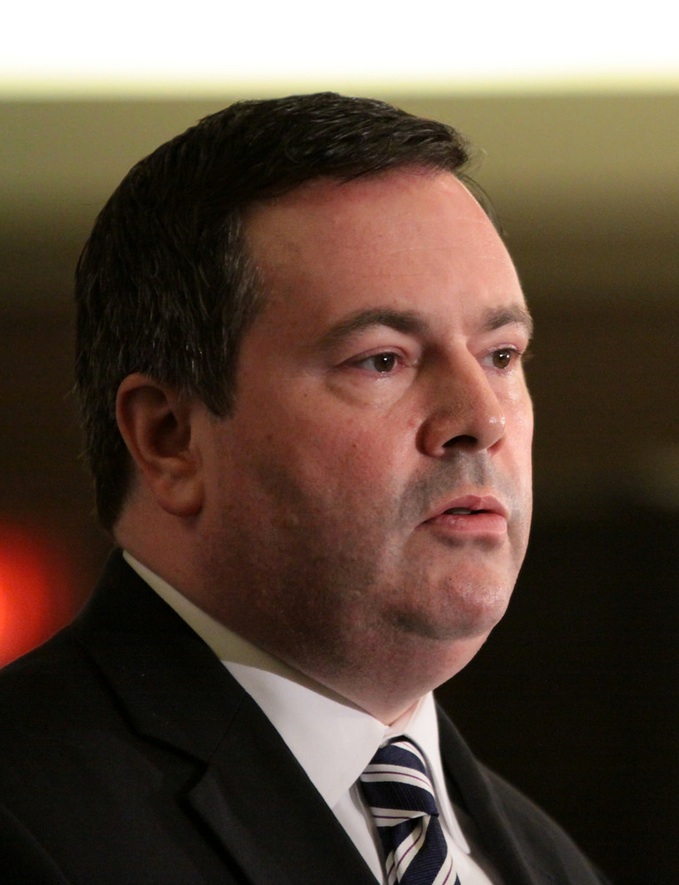Like this article? rabble is reader-supported journalism. Chip in to keep stories like these coming.
There was head scratching and puzzled disapproval on social media Thursday night at Jason Kenney’s seemingly bizarre Twitter celebration of Britain’s unanticipated “Brexit” vote, many unhappy returns of which are yet to be enumerated.
Responses from across the political spectrum ranged from perplexed to angry when the former Harper Government cabinet minister and rumoured candidate for the leadership of Alberta’s Progressive Conservative Party — channeling Nigel Farage, Brexit advocate and leader of the crypto-fascist U.K. Independence Party — tweeted “Congratulations to the British people on choosing hope over fear by embracing a confident, sovereign future, open to the world!”
Never mind that there isn’t really a British people, the U.K. being a united kingdom and all that, this was seen as peculiar coming from a man who is nowadays being touted as a future leader of a jurisdiction that depends desperately on international trade to prosper, and perhaps even to survive.
The Canadian province of Alberta, with an economy based heavily on the petroleum industry, is undergoing relatively hard times from low oil prices and a lack of access to foreign markets. So one might have thought Kenney would have been more cautious in his remarks on this sensitive topic, whatever his private views might be.
On the contrary, however. Faced with the wonderment and disapproval of his social media critics — “I’m speechless,” said former Alberta PC deputy premier Thomas Lukaszuk, about whom Kenney has a famously nasty opinion; “This is remarkably ill-judged,” exclaimed Andrew Coyne — Kenney fired back with both barrels and kept it up with a stream of tweets reiterating the same point.
But it would be a mistake to assume Kenney didn’t know exactly what he was doing when he sent that tweet, and the ones that followed.
The man, after all, is a master dog-whistle politician — the term of art for demagogues who send silent messages between their spoken lines to stoke their supporters’ fury and hatred. And, have no doubt about it, Kenney’s red-meat base here in Alberta is full of rage worthy of the angriest Brexit supporter.
So why would a politician who has been a tireless advocate of “free trade” deals like NAFTA, the Trans Pacific Partnership and the Comprehensive Economic and Trade Agreement with the EU, all of which tend to chip away at Canada’s national sovereignty, be a big supporter of a foreign group that wanted to end Britain’s membership in the European Union on the grounds it was chipping away at the U.K.’s sovereignty?
The answer, one suspects, lies in the subtext of the Brexit debate, and in particular the arguments advanced by the far-right, xenophobic UKIP, as Farage’s party is commonly known.
The Brexit movement, as Doug Saunders of The Globe and Mail summed up bitterly, “despite being the product of an extreme-right leader whose party holds one seat, despite being rejected by the leader of every conventional political party, despite having descended into use of racial-terror images of brown-skinned hordes as its central argument, despite its more zealous followers resorting to the assassination of a sitting member of Parliament, managed to prevail.”
In other words, the “Leave” side’s principal argument came to be characterized by many of the EU’s British opponents’ racial, religious and cultural hatreds. And the outcome of the Brexit campaign suggests this approach is highly effective.
Therein lies Kenney’s dog whistle. His supporters know what they have in mind when he tweets to one of his interlocutors: “I respect the decision of the British people who will be unencumbered to pursue more global free trade & non-EU migration.”
And, like Farage’s supporters across the pond, they are not displeased to see their potential leader signalling his support for their ugly view of the world, even if he insists to the rest of us he meant something else.
In this particular case, who knows for sure? It’s all just vague enough that maybe the only thing he really meant was that the British should be unencumbered by the human rights and labour mobility provisions of the European Union, which in fairness do not tend to be features of the corporate rights treaties masquerading as free trade deals favoured by Kenney and his party.
This kind of silent dog-whistling, though, is nothing new for Kenney. Indeed, it’s among his go-to techniques.
Consider, in the recent past:
- His “corrosive” social media misrepresentation of an Islamic religious ceremony.
- His accusation that “people like” Calgary Mayor Naheed Nenshi were “politicizing” the niqab controversy his own party had ginned up for political purposes during the 2015 federal election.
- His Tweet suggesting Indigenous people are just “settlers” too.
- His characterization of “perfect, unaccented English” as an essential quality of being Canadian.
- His catcalls in Parliament mocking the minister of national defence’s manner of speaking by demanding “English-to-English translation.”
Each one is wholly offensive. Each one is perfectly deniable. The man has become, according to rabble‘s Michael Stewart, “basically Canada’s greatest troll.”
The sotto voce message to those in the know, reminiscent of the Nixonian Southern Strategy, is: Shhhh … I’m your guy.
Well, one thing’s for sure, as yet another tweeter said Thursday, with attitudes like these, Kenney has obviously lost interest in running for the leadership of the federal Conservatives. That’s not necessarily very reassuring if you care about Alberta, its reputation in the rest of the country, and the world.
This post also appears on David Climenhaga’s blog, AlbertaPolitics.ca.
Image credit: Facebook
Like this article? rabble is reader-supported journalism. Chip in to keep stories like these coming.



